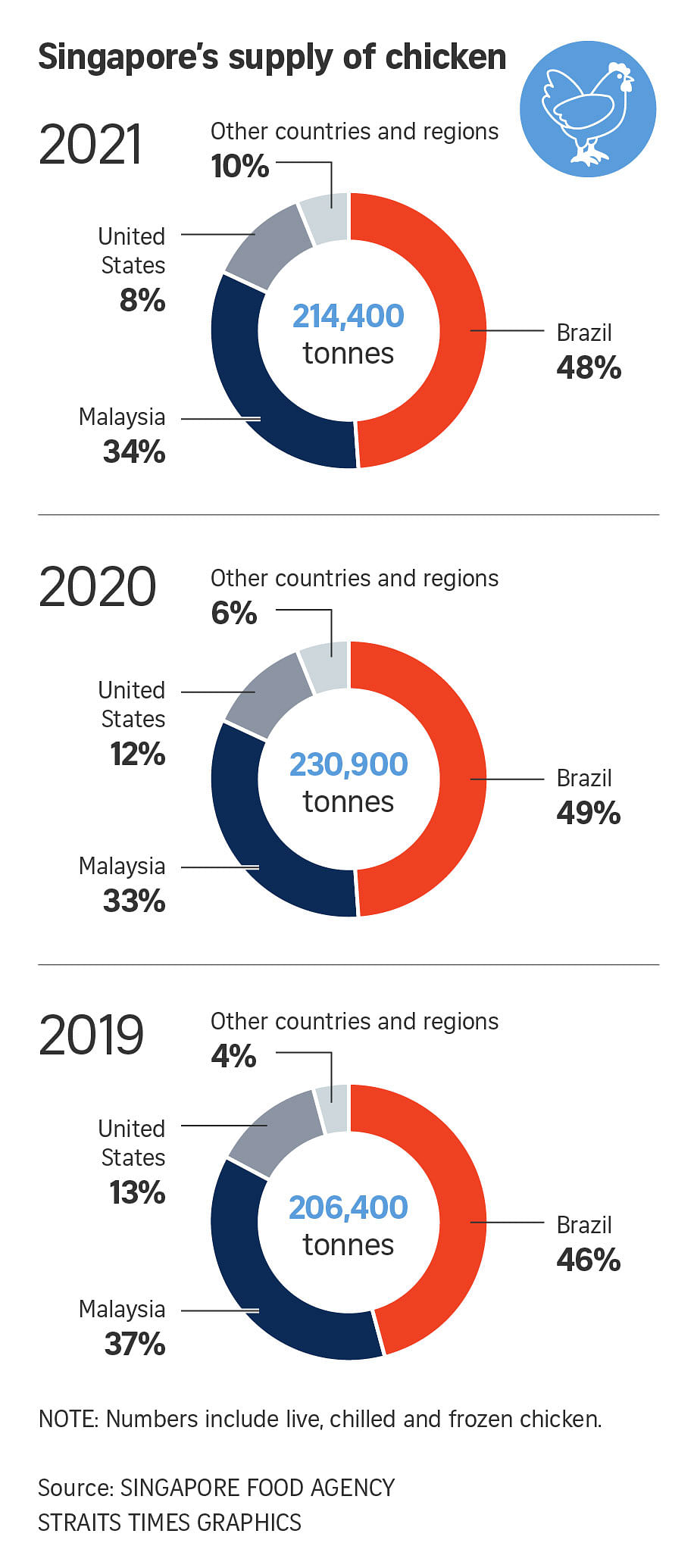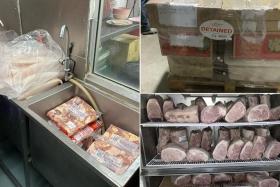S'pore eateries scramble to find other fresh chicken sources ahead of Malaysia's export halt
With a week to go before Malaysia's export ban on chickens kicks in on June 1, eateries here are scrambling and working with suppliers to find alternative sources of fresh chicken.
On Monday (May 23), Malaysian Prime Minister Ismail Sabri Yaakob announced that his country will halt the export of up to 3.6 million chickens a month from June 1, until domestic prices and production stabilise.
Eateries like Taiwanese fried chicken chain Monga said Malaysia's decision will hit their business hard. The chain, which has three outlets here, gets its chicken solely from Malaysia.
"The F&B (food and beverage) industry has already taken a bad hit from Covid-19 and things have only started getting better for us recently... The ban is both untimely and brutal," said Mr Lem Cheong, director of operations at Baoshi F&B Management, which owns the Monga chain here.
The price increase in chicken was immediate, with its supplier saying that the price will go up by $1.20 per kg as of Tuesday.
"We are keeping our fingers crossed about the price hike after the ban kicks in (on June 1), but we are expecting prices to triple," said Mr Cheong, who added that his company is actively sourcing for alternatives.
According to the Singapore Food Agency (SFA), about one-third of Singapore's chicken supply is imported from Malaysia. Other major sources include Brazil and the United States.
SFA said on Monday it will work with stakeholders to activate supply chains to increase imports of chilled and frozen chickens from alternative sources, or draw from poultry stocks.
Both restaurants and hawkers The Straits Times spoke to said getting fresh chickens will be an issue, but frozen chickens should still be available.
Veteran chef Damian D'Silva, who runs multicultural, heritage cuisine restaurant Rempapa in Paya Lebar, said: "Our supplier has indicated that it has already started sourcing from other countries, but even then, fresh chicken will be a problem because of transportation."
His menu includes several signature dishes that use fresh chicken from Johor, including nasi lemak, chicken curry and debal chicken.
As for how this will affect taste, he added: "I think we all know the difference between fresh and frozen (chicken), and we just have to lower our expectations till things improve."
Several hawkers at 84 Marine Parade Central Market and Food Centre said they will not be affected by the ban as they use frozen chicken.
One of them is Mr Stan T, 55, who runs curry chicken stall Tip Top Simply Curry.
He said there is a possibility that the price of frozen chicken will also increase, but he will try his best not to pass that on to his customers.

D'Authentic Nasi Lemak uses frozen chicken bought from NTUC FairPrice.
Stall owner Sulaiman Abu, 62, said: "Overall, I don't think my business will decrease by much... even if I cannot sell chicken. My stall sells other things as well.
Others are not as confident about business prospects in the coming months.
Ms Jane Yeo, who runs chicken rice stall Yi Lu Fa - which opened only a month ago - expects business to drop by 70 to 80 per cent. All of the stall's chicken comes from Malaysia.
"When I first heard the news, I was stunned, and thought to myself, 'What should I do?' And I felt like crying," said Ms Yeo, who is in her 40s.
"We will not close as we also sell roasted pork, but the chicken is the main star. The rest are just supporting characters.
"I really hope that the Government can step in to help us because there is very little we can do."
Big name brands are also assessing their options after the sudden announcement by the Malaysian government.
In response to queries from ST, chicken-centric fast-food chain KFC said it works with a diverse group of suppliers, and a portion of its chicken is from Malaysia.
"Since the latest news about Malaysia's decision to halt exports of chicken, we are still assessing the impact of the situation. Our team is working closely with our suppliers to continue serving chicken to our fans in Singapore," said its spokesman.
McDonald's, which has several chicken dishes on its menu, declined comment.
However, smaller players like home-based business Naked Chicken, which sells home-style fried chicken in limited quantities every week, is choosing to shut down for now.
In an Instagram post on Monday, it said it will cease operations indefinitely from May 30 as a direct result of the temporary Malaysian export ban.
The eatery's chickens, which come from its founders' family business Toh Thye San Farm, are GG French poulet - a high-quality breed from France, and are raised hormone-free, antibiotic-free and cage-free in Johor Bahru, Malaysia.
Consumers ST spoke to are resigned to the fact that the cost of living is going up.
"Even if I wanted to stop eating chicken due to the high price, wouldn't everything else also be expensive?" asked Ms Gloria Cheong, 69, a retired accountant.
"It feels like there's no alternative because everything is expensive and (prices are) increasing. So it's not like we can make major changes in our lifestyle in order to escape the high price... I can say I want to change to other meats, but the other meats will also be pricey."
Financial manager Jesslyn Lee, 42, who has a family of four, said that while the price of chicken is increasing, it is not yet impacting her lifestyle much.
"Maybe when it hits $6 for a regular plate of chicken rice, or over $15 for a whole spring chicken, I might start reconsidering (it as a staple in my family's diet)... For now, I guess it's okay," she added.
Get The New Paper on your phone with the free TNP app. Download from the Apple App Store or Google Play Store now



